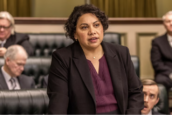
‘Youth has a stake in the issue of climate change’
Inspired by participating in the Youth for Eco-Justice training, a joint project of the World Council of Churches (WCC) and the Lutheran World Federation (LWF) in Durban, South Africa last year, Kristi Holmberg started a “Climate Justice Campaign” which concluded successfully on April 22, Earth Day. The campaign engaged a number of students, faculty and community members at the Luther College in the US state of Iowa, where Holmberg is a student. In an interview with WCC Communications, she talks about the impact of her campaign and the role of young Christians in climate justice struggles.
What is your project and what does it aim to accomplish?
With students, faculty and staff at Luther College, I organised a Climate Justice Campaign leading up to Earth Day. My project seeks to raise awareness about climate change as a peace and justice issue. Through this campaign we advocated for our collective vision for a sustainable and just future. We also tried to influence world leaders through local action leading up to Rio+20, the United Nations Conference on Sustainable Development.
In the first week we focused on sustainable living, collected personal pledges for sustainable lifestyles choices from students, hosted a film and dialogue event “Live Simply So Others May Simply Live: Climate Change, Social Justice, and Sustainable Living”. I produced this film as a summer research project, and it features people in my community who demonstrate a sustainable lifestyle.
In the second week we focused on political mobilisation. We collected 350 student petitions to ensure that the next college president continues a commitment to sustainability. It was presented to the co-chairs of the college search committee.
During the Annual Peace Week educational events hosted by Luther College, different global concern student groups addressed the theme “The Future We Want” following an initiative of the Rio+20.
Finally on Earth Day we organised a “Human Mosaic Celebration”. We formed a tree (which is also our campaign logo) on the college’s Library Lawn to convey our collective vision for a sustainable and just future. We took an aerial photo of the participants and we will use it for advocacy leading up to Rio+20.
Why are campaigns like yours important and how do you see the role of youth in such initiatives?
While Luther College has been recognised nationally for its leadership on sustainability in recent years, my project helped the community to understand why we have a wind turbine, why recycling isn’t enough, and why we need to take personal and national responsibility for the problem of climate change.
Our campaign invites groups and individuals to come together as a community to engage with an important global issue. My hope is that people learn to view climate change through a peace and justice lens, feel empowered by doing concrete actions, and get inspired to continue collective advocacy projects at Luther College.
In Durban, it was pressed upon me that the voice of youth is important in peace and justice issues. I realised we have a significant stake in the issue of climate change because the decisions made by our elected officials are likely to affect our futures more than the people sitting in the convention centers.
I have struggled personally to find a sense of voice and agency in a society dominated by cynicism. I hope this project will be an opportunity for students like me to practice civic engagement, envision a sustainable and just future, and cultivate a thoughtful, humble, but passionate voice in response to this issue.
The campaign is also important because our local actions, the petitions, pledges and people participating contributed to Mobilise U, an international campaign of college students hosted by the Earth Day Network. Students from Luther College joined young people around the world trying to reach “One Billion Acts of Green” leading up to Rio+20.
Why do you think climate change is a justice concern? And what is its significance for young people in the churches?
The phrase “climate justice” highlights climate change as a peace and justice issue. As sea levels rise and droughts worsen due to the earth’s rising temperature, climate change is expected to have a disproportionate impact on the world’s most vulnerable people and intersect issues of gender, race and class. It will exacerbate pre-existing socio-economic injustice associated with food, water, land etc.
In Durban, I observed that faith communities can advocate for values of justice and compassion. I also see Christian discipleship as a way of life. As young people we will inherit the mistakes of previous generations, but we also are faced with the task of finding new ways of thinking and living: a sustainable and ethical vision for Christian discipleship. If the church wants to be relevant to the issues my generation faces, it is imperative that it respond to climate change.
How did Youth for Eco-Justice training in Durban inspired your project?
In Durban, I heard personal accounts from participants on how climate change is affecting their visions for a sustainable and just future. I gained a deeper understanding of theological and ethical perspectives on justice and creation. Also, my participation in grass-roots level activism taking place during the UN negotiations was most inspiring.
I was at an interfaith rally when religious leaders and youth presented 200,000 petitions to Desmond Tutu and presidents of the UN convention on climate change calling for “climate justice”. I marched with 20,000 people on the Global Day of Action and witnessed the passion among people.
My participation in the “Africa Roars” human mosaic organised by Greenpeace was tremendously inspiring. Such models of collective action shaped the collaborative nature of my project. These experiences cultivated my own sense of voice and agency that I hope to use in my work.
In a way, the networks of the WCC and LWF resemble the interconnectedness of a human mosaic. With its diversity and international scope, they are able to advocate for climate justice, promote cooperation and connect youth and others from around the world. Climate change is a global, complex issue that goes beyond any one nation or group, so this connectedness is especially important for a sustainable and just future.
Watch video “Live Simply So Others May Simply Live”
More information on the WCC and eco-justice
The World Council of Churches promotes Christian unity in faith, witness and service for a just and peaceful world. An ecumenical fellowship of churches founded in 1948, today the WCC brings together 349 Protestant, Orthodox, Anglican and other churches representing more than 560 million Christians in over 110 countries, and works cooperatively with the Roman Catholic Church. The WCC general secretary is Rev. Dr Olav Fykse Tveit, from the [Lutheran] Church of Norway. Headquarters: Geneva, Switzerland.




























































